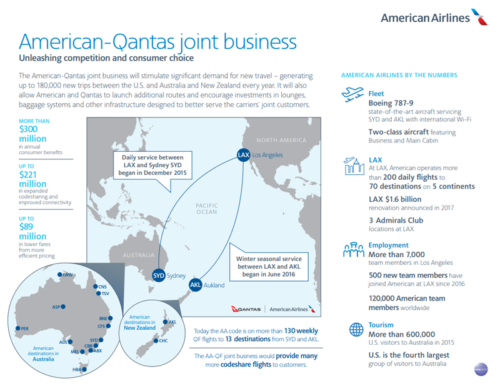Back in 2016, American and Qantas filed for antitrust immunity for a joint venture on flights between the US and Australia / New Zealand. After a review of several months, the airlines expressed shock when the DoT ruled against them, despite Delta (Virgin Australia) and United (Air New Zealand) having similar JVs. At the time, the DoT stated that the American / Qantas venture would be different as it would be anti-competitive to allow a partnership between the largest US carrier and the largest Australian carrier.
Well, two weeks ago American refiled their application which will again take several months to review. They are hoping that the Trump administration will look more favorably on the JV and that the approval of the Delta / Korean Air partnership hints at a greater likelihood of approval. The airlines are going as far as to say that not gaining approval will jeopardize several routes.
An expanded relationship will encourage significant improvements in the overall customer experience, including additional frequent flyer benefits and investments in lounges, baggage systems and other infrastructure designed to better serve the carriers’ joint customers. All these benefits will stimulate significant demand for new travel – generating up to 180,000 new trips between the U.S. and Australia and New Zealand every year.
Critically, if the joint business is not approved, American and Qantas will have no choice but to further reduce codesharing on their networks. This will jeopardize the number of services and routes each carrier flies between the U.S. and Australia and New Zealand.
For example, Qantas may be forced to reduce the frequency of, downgauge or potentially cancel its A380 service between Sydney and Dallas/Fort Worth, and American may further reduce its services between Los Angeles and Sydney and Auckland. These routes rely on codeshare support from each airline’s feeder network via their respective hub cities to be economically viable.
The airlines say that proposed joint business will significantly improve service, stimulate demand and unlock more than $300 million annually in consumer benefits that are not achievable through any other form of cooperation, including:
- Up to $221 million in value from expanding codesharing between American and Qantas – opening more connections to more destinations.
- Up to $89 million in value by offering a wider range of fare classes across each other’s networks, including lower fares and discounts.
American and Qantas also contend that a JV would give them the opportunity to launch additional routes between the U.S. and Australia and New Zealand, including new flights to city pairs currently not served by either carrier.
The rejection of the last JV actually directly impacted my First Class flight to Australia in December. I was able to snag AA First availability on their 777 when the carrier mistakenly released a whole bunch of First and Business class award inventory from LAX. However, my First Class flight was switched to Business when the flight was downgraded to a 787 in order to show less combined capacity on the shared US-Australian routes.
The responses below are not provided or commissioned by the bank advertiser. Responses have not been reviewed, approved or otherwise endorsed by the bank advertiser. It is not the bank advertiser's responsibility to ensure all posts and/or questions are answered.
